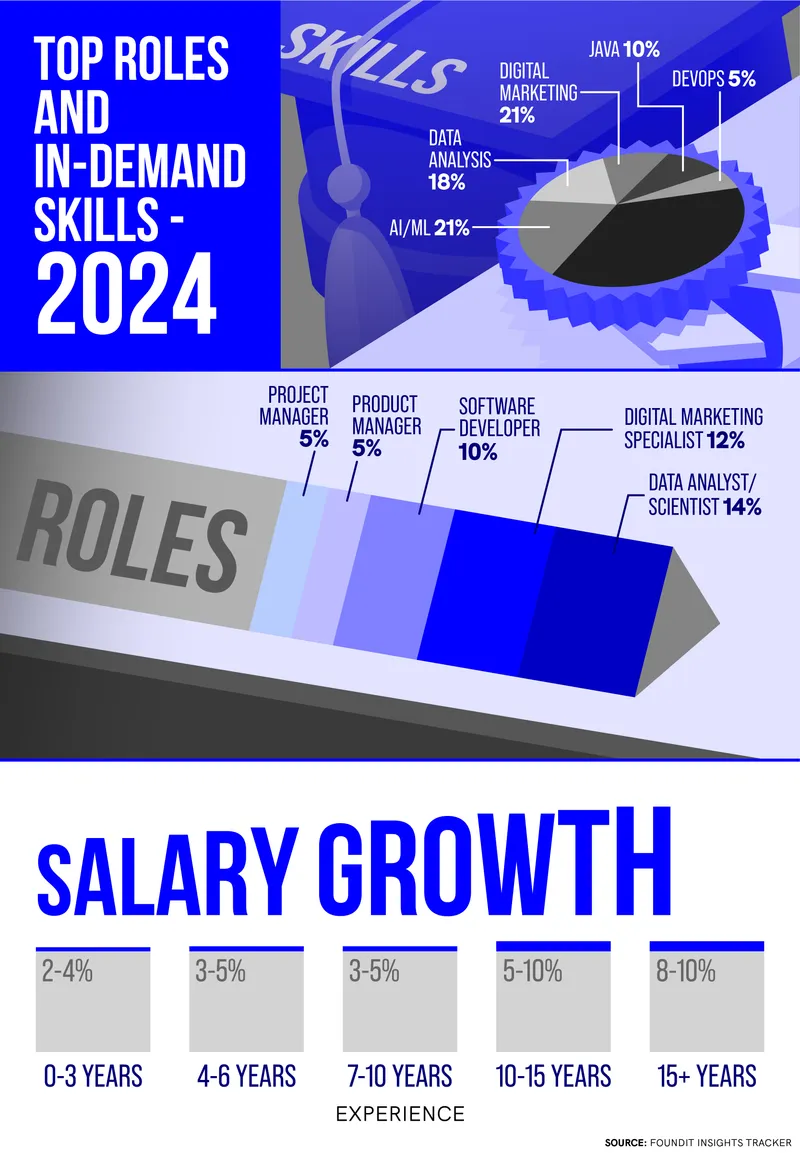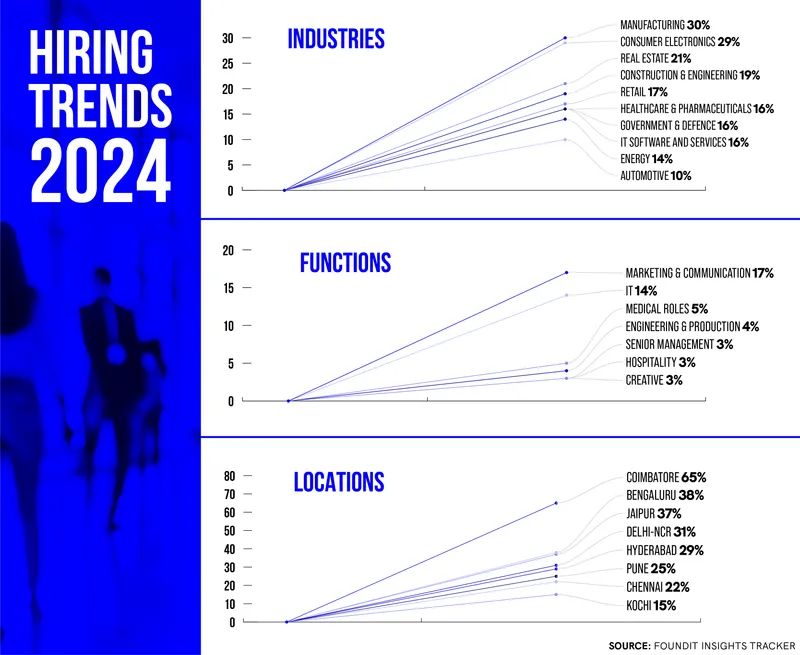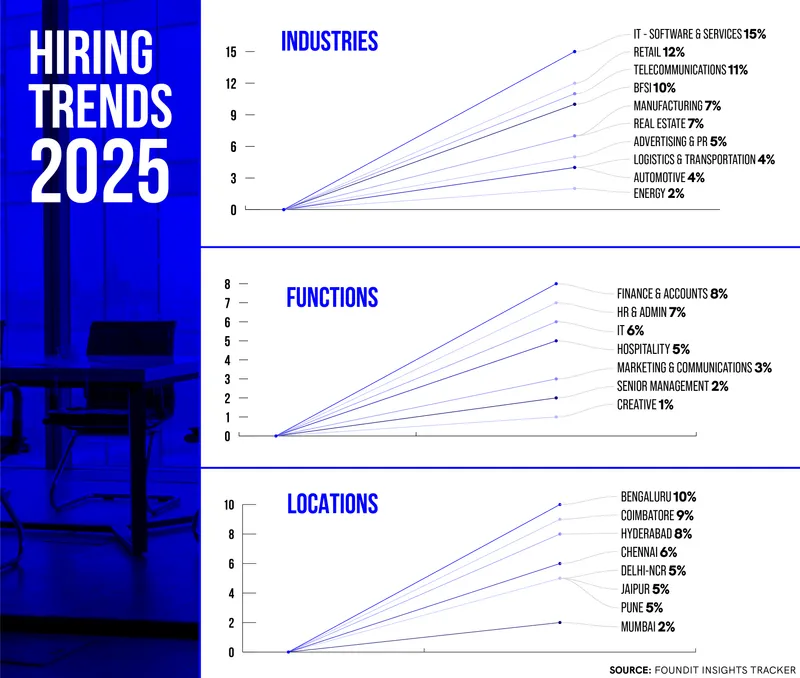The hiring landscape in 2024 witnessed a delicate balance between caution and optimism.
After the tumultuous cycles of the past few years—defined by over-hiring, mass layoffs, and economic headwinds—this year saw the job market stabilise with a renewed focus on strategic hiring.
“Cautious optimism” is a befitting term to describe the overall mood in hiring in 2024, says Naveen Tiwari, Co-founder of recruitment firm Scrabble. Despite the economic challenges, the overall hiring activity improved this year, he adds
The overall hiring activity in India surged 10.05% in 2024, according to Insights Tracker – Annual Trends 2024 by jobs and talent platform foundit (formerly Monster – APAC & ME).
The lessons learnt in 2024 are paving the way for a promising 2025, with the job market poised for expansion, and a cautious outlook will give way for confidence in an improved hiring landscape.

Design: Nihar Apte
Hiring across levels
Hiring for freshers and entry-level roles surged in 2024, driven by strong demand for skills in artificial intelligence (AI), cloud computing, and data analytics, led by global capability centres (GCCs) and IT services firms.
Hiring for mid-level management roles remained stable, with selective additions aligned to business growth. Compared to 2023, hiring for top management roles, including CXOs, slowed as companies prioritised cost optimisation and internal promotions.
However, strategic roles such as chief AI officer and chief digital officer were in demand, reflecting their critical role in driving business innovation, points out Krishna Vij, Business Head, TeamLease Digital, a tech professional services platform.
Tiwari of Scrabble says there was a growing demand for C-suite talent in areas such as risk management, digital transformation, and sustainability.
According to foundit, entry-level roles (0-3 years experience) saw a 3% increase, while hiring for associates with 4-6 years of experience rose by 4% over 2023. Mid-senior positions (7-10 years) experienced a steady demand, while senior roles (11-15 years) saw a 3% decline. Meanwhile, hiring for roles requiring 16+ years of experience saw a modest 1% uptick.

Design: Nihar Apte
Learnings from 2024
Shortage of talent in niche areas, skill gaps, and fierce competition to hire top-tier candidates were some of the challenges in 2024. New and emerging businesses required specialisation in specific areas, which made talent acquisition quite difficult.
“One of the major impediments was the lack of perfect talent in high-demand sectors like data science and artificial intelligence,” says Tiwari.
He explains that, while the supply of talent exceeded demand, finding top-quality candidates with the requisite skills within the talent pool proved challenging.
Skill gaps have enforced the need for upskilling initiatives and collaborations between industry and academia to ensure a consistent pipeline of job-ready talent in the future.
With automation and evolving business needs reshaping job roles, continuous learning and adaptation have become key to remaining competitive in the job market.
Upskilling is essential not only for early-stage professionals but also for those at more advanced stages in their careers, with the risk of layoffs still looming.
“The 2024 layoff wave was driven by global economic uncertainties, over-hiring during the post-pandemic boom, automation, and startup funding challenges,” Vij notes, adding that geopolitical tensions further disrupted hiring across industries.
She elaborates that the most significant layoffs occurred in IT and technology, ecommerce, startups, edtech, and manufacturing, as companies streamlined operations to address declining demand and adapt to evolving business landscapes.
Industry data indicates that layoffs in sectors such as IT and ecommerce ranged between 5% and 7%, driven by economic uncertainty and the rise of automation.
“The technology sector remains vulnerable to potential layoffs in 2025, along with retail, manufacturing, and finance. These layoffs could be triggered by various factors, including economic uncertainty or recession pressures, pushing organisations to implement cost-cutting measures,” states Tiwari.
He adds that rapid technological advancements, particularly in AI, may render some roles obsolete; so it is advisable to focus on upskilling and diversifying income streams.
The message is loud and clear: upskill or be left behind.
By enhancing their skill sets, professionals can position themselves better in the job market, seize new opportunities, and stay resilient in the face of uncertainty.

Design: Nihar Apte
A positive outlook
Experts expect hiring activity to be stronger in the coming year, on the back of improved funding.
“As we enter 2025, India’s job market looks set to broaden its horizons, with a projected 9% growth in hiring,” says Anupama Bhimrajka, Vice President – Marketing, foundit.
Tiwari forecasts a positive hiring trend in 2025 for both middle-management and senior-level roles. There will be a particularly high demand for people in blue-collar and junior roles, as more companies become profitable and seek to expand to the next stage of growth.
Vij of Teamelease believes hiring for freshers will accelerate, driven by the demand for skills in IT, AI, and emerging technologies. In fact, 42% of companies are focusing on hiring junior engineers, signalling a strategic shift towards nurturing entry-level talent, she says.
The recovery in hiring will be driven by a surge in fresher hiring.
Vij expects fresher hiring to grow by 20-25%. Sectors like BFSI, healthcare, and retail will be the key drivers; fresher hiring in these industries is projected to increase by 30-35%, she adds.
Hiring trends in 2025 will be shaped by the needs of companies operating in green energy, electric vehicle manufacturing, and AI-driven industries. Alongside continued growth in IT, healthcare, and GCCs, these sectors will drive the focus on innovation and sustainability, ramping up hiring in the process.
Experts also foresee large-scale movement of professionals from Tier I to Tier II cities, as GCCs expand their presence and remote/hybrid work models become more prevalent.
“Companies are broadening their search beyond established hubs,” notes Anupama Bhimrajka, Vice President – Marketing, foundit.
Tiwari points out that the gig economy and flexible work models will expand, leading to increased recruitment.
(Cover image and infographics designed by Nihar Apte)










